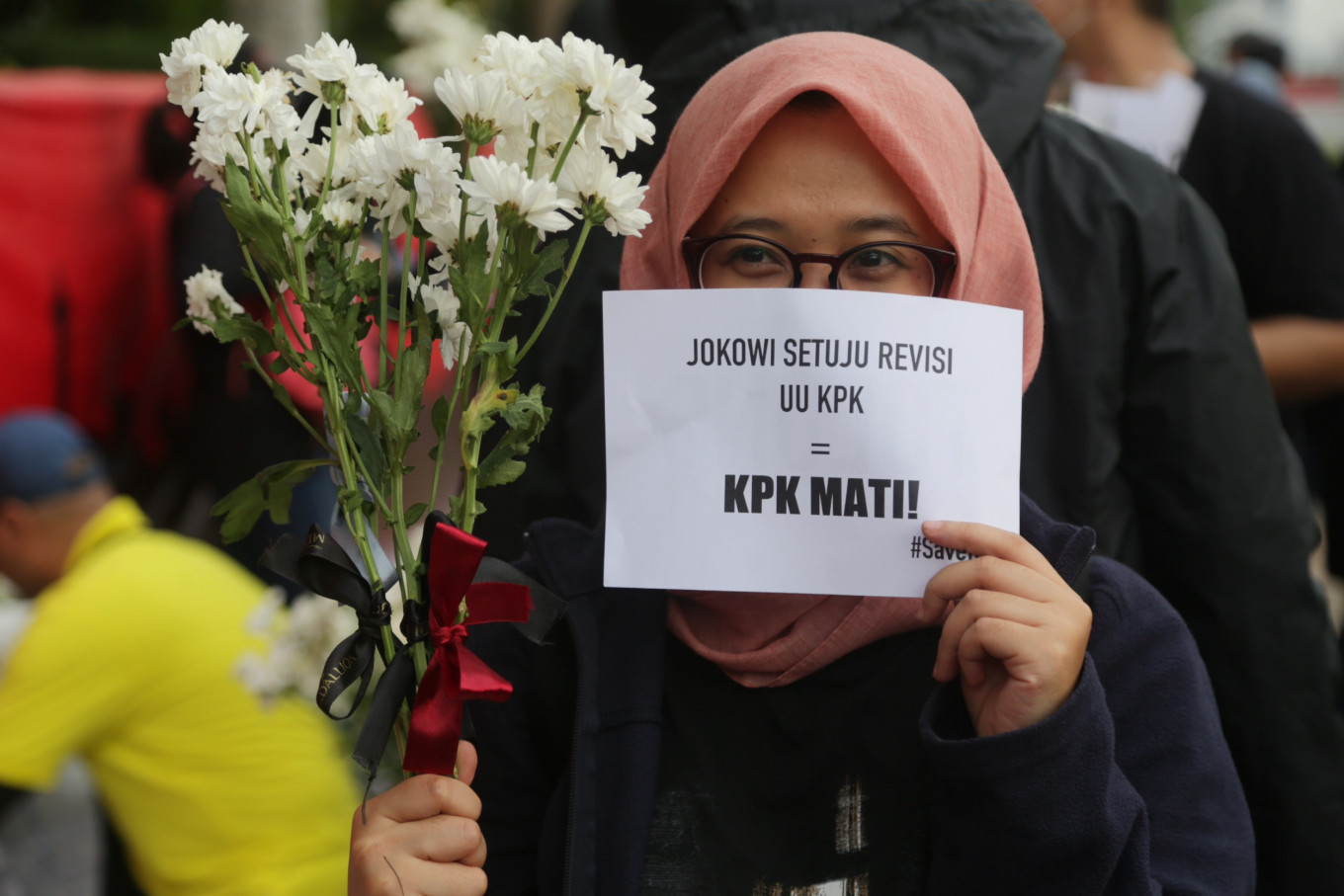Popular Reads
Top Results
Can't find what you're looking for?
View all search resultsPopular Reads
Top Results
Can't find what you're looking for?
View all search resultsWithering away of KPK?
The bill on the amendment of the KPK Law currently tabled by the House of Representatives is just part of a long-running, systematic and structured effort to paralyze the antigraft body, hence depriving the country of a chance of winning its war on corruption.
Change text size
Gift Premium Articles
to Anyone
 Resistance: A Corruption Eradication Commission (KPK) staff member carries flowers to be given to members of the public during a rally on the sidelines of a Car Free Day event at the Hotel Indonesia traffic circle in Central Jakarta on Sunday. She also holds a piece of paper with a message that highlights KPK employees’ opposition to a revision of the 2002 KPK Law, which they say will weaken the antigraft body. (JP/Wendra Ajistyatama)
Resistance: A Corruption Eradication Commission (KPK) staff member carries flowers to be given to members of the public during a rally on the sidelines of a Car Free Day event at the Hotel Indonesia traffic circle in Central Jakarta on Sunday. She also holds a piece of paper with a message that highlights KPK employees’ opposition to a revision of the 2002 KPK Law, which they say will weaken the antigraft body. (JP/Wendra Ajistyatama)
S
ince its inception in 2003, the Corruption Eradication Commission (KPK) has lived dangerously as evidenced by the acts of terror against its investigators and moves to undermine it as an institution. The bill on the amendment of the KPK Law currently tabled by the House of Representatives is just part of a long-running, systematic and structured effort to paralyze the antigraft body, hence depriving the country of a chance of winning its war on corruption.
In the absence of most lawmakers, the House plenary session last Thursday unanimously approved the bill. Sponsored by lawmakers from political parties that support the government of President Joko “Jokowi” Widodo, the amendment now tops the legislative agenda of the current House, the term of which will end in about three weeks.
That the politicians are poised to speed up the revision should raise questions about the motives behind the sense of urgency. But whatever the reason is for pulling the trigger, the amendment will do more harm than good to the country’s campaign against graft in many ways.
Not only does the draft stipulate the establishment of a council to supervise the KPK, it also seeks to reduce the commission to a government body. If passed, the bill will deprive the KPK of its much-needed independence. Without independence, the integrity of KPK leaders and investigators will be meaningless.
In their draft amendment, the lawmakers intend to restrict the KPK’s wiretapping power, an authority that has so far helped the commission ensnare several powerful miscreants. As of last June, the KPK had named 225 lawmakers suspects, as well as the leaders of six political parties, 130 regional heads and 27 heads of state agencies and ministers — a feat other law enforcement agencies cannot rival. Wiretapping has helped the KPK conduct sting operations that have resulted in big catches.
Unsurprisingly the KPK has met with stiff resistance as exemplified in the so-called cicak (gecko) versus buaya (crocodile) saga, which arose after KPK investigators arrested police generals for alleged graft. There were times when the police appeared intent on criminalizing KPK leaders and senior investigators even for mistakes they had allegedly committed in the past.
The draft law would further weaken the KPK as it requires the commission to consult the Attorney General’s Office when it comes to sentences demanded for suspects. Worse, the KPK will no longer be allowed to take over cases from other law enforcement agencies, whose level of public trust cannot match the KPK’s.
Many fear that lawmakers will endanger, if not kill outright, the anticorruption drive. President Jokowi could precipitate the withering way of the KPK if he approves the deliberation of the bill. For political reasons, Jokowi may allow the debate at the House to proceed so as to solidify the legislature’s support for him, especially as he will start his second five-year term soon.
Hopes, however slim, abound, that Jokowi will bow to public demands to rescue the KPK from its peril as he did in the past. We need more voices to make him respond accordingly.









